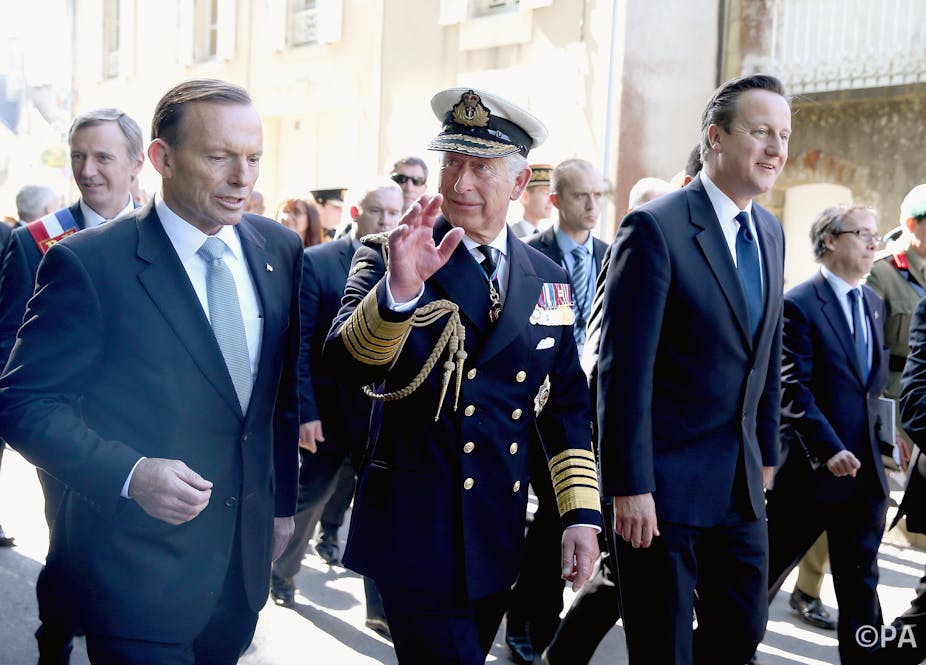Australian Prime Minister Tony Abbott’s government was sworn in just over one year ago, making this an opportune moment to review its performance from an international perspective. Abbott and his Canadian counterpart Stephen Harper lead relatively unfettered conservative governments, at a time when the US leadership is Democrat and Britain’s Tory government is in coalition with the Liberal Democrats.
Their siren call – particularly Abbott’s – suggests what the Tories might do were they to rule in their own right. Abbott’s voice is also amplified by Australia chairing the G20 this year.
Abbott came to power promising to stop the stream of boats of asylum seekers crossing from Indonesia, repeal the carbon and mining taxes, cut back the public sector, and renew the country’s infrastructure with major new road building. Left-wing cartoons portrayed him as a wrecking ball.
After some unavoidable horse-trading with the “Pups” (the Palmer United Party Senators), the “useless” carbon tax went, as did the mining tax; the refugee boats were stopped by means of some complex deal-making with the Indonesians; and a harsh budget was brought down. Infrastructure renewal remains to be tackled. In his terms, so far so good.

International events have also created opportunities for statesmanlike interventions: some rhetorical and some practical.
The disappearance of flight MH370 on his patch allowed Abbott to say Australia “owed it to the world” to find it. When later MH17 was downed in the Ukraine with many Australians on board he called robustly for a Russian explanation for this “completely, absolutely and utterly unacceptable” act. And he not only denounced the Islamic State as nothing but a “death cult” but, in answer to President Obama’s request, is sending 600 Australian troops to the United Arab Emirates, including combat aircraft and special forces troops, while much of the world dithers.
At home, a timely Royal Tour at Easter by the Duke and Duchess of Cambridge, with baby Prince George as the star attraction, gave a strong boost to the monarchists, for whom Abbott is the main cheerleader.
Still, so far so good.
Yet, Abbott’s government trails in the polls. A full 70% of the Australian electorate disagree with Abbott’s position on climate change. The budget cut much, created little, and dismayed many.
As Abbott goes on, friendships around the world, too, are being tested. Relations with Indonesia have only just begun to recover in recent months, after their president’s phone was tapped by Australian spooks. The Chinese are pleased to be Australia’s main trading partner, but less so at Abbott’s forthright criticism of their extending the no-fly zone in the South China Sea and his agreement with Japan to sell them military equipment and technology. Also, selling “model citizen” India uranium will not make friends in China or Pakistan.
Most of all, Abbott’s and Harper’s refusal to sign up to Obama’s climate change initiative in advance of the G20 will have angered the US administration (and dismayed the British and other governments who support it). Even Scotland’s (now resigned) First Minister Alex Salmond saw fit to slap Abbott down when he poked his head into the Scottish referendum debate saying it was not in the world’s interest for Scotland to secede from the UK.
Most bizarre has been Abbott’s quixotic and highly personal reintroduction of imperial honours in Australia. Why on earth wind the clock back a generation by bringing back knights and dames? As he revealed in an interview with Michelle Grattan, he felt:
the prime minister is entitled to make these sorts of decisions with the monarch. I took a few soundings. In fact I took some quite widespread soundings on this and, as you’d expect, some people were more in favour than others. The soundings that I took obviously didn’t deter me from a particular course of action.
And why did Abbott take on the UNESCO World Heritage Committee in a failed attempt to free 74,000 hectares of listed Tasmanian wilderness when only 1% of Tasmanians depend on forestry and 15% make a living from tourism?

These Abbott antics were reported in Britain, by the left with alarm and the right with a certain envy.
In British Prime Minister David Cameron’s recent cabinet reshuffle, outgoing environment minister Owen Paterson said he regretted his government had not supported him sufficiently in his struggle with the “green blob” of climate and environmental lobbyists and that he took his inspiration from Abbott. And why can’t Cameron handle the Lib Dems as deftly as Abbott does his Pups?
It so happens that Abbott, Cameron and London’s Conservative Mayor Boris Johnson share the same professional electoral strategist, the Australian polling magician Lynton Crosby. But Crosby’s book of secret spells has more than one remedy.
Maybe by watching Abbott the British will get a whiff of what a Boris Johnson premiership might look like should Cameron fall.
Abbott is known internationally as a hard man – posing Putin-like, with bare torso in his budgie-smugglers after a swim or a gruelling ironman triathlon, looking the world in the eye and taking no prisoners.
Boris, on the other hand, slightly comically perched on his bike, is more mercurial, more charismatic and much more progressive. I expect the long-term electoral appeal in both countries will be for his more life-affirming, liberal and cosmopolitan brand of conservatism.

